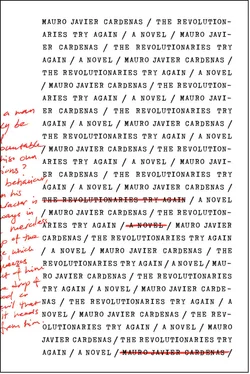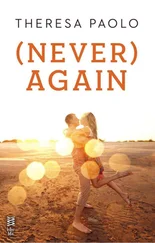His father’s driving them down the hills of Mapasingue obviously trying to calm Rolando by asking him how did you two meet? — to which Rolando doesn’t answer — You and Eva was it at the university? — At a protest? — Did you kick her in the shins at a soccer match? — to which Rolando does answer by saying Eva doesn’t wear shin guards Dad — Does she raise her socks all the way or bunch them at the bottom? — Bunches them — aha — Says she wants the other team to see her bruises so that they’ll know she doesn’t care about bruising them or them bruising her — That makes sense — It’s redundant because she’s always yelling at the other team so they know not to mess with her — Did her yelling stop you from messing with her? — Of course not — Do they red card her often? — No but she plays her best when someone on our team has been red carded and we’re down to ten — The other day Eva told me — How often do you guys talk? — Every day I think — Amazing — What’s so amazing you think your father is not good at listening? — What? — You think your father is not good at listening? — What? — Very funny — Sorry — The other day she called me and said she was writing a love letter to the one boyfriend who had broken up with her — What? — From when she was fourteen relax — Ah — She wasn’t going to send it she said she just wanted to write him a love letter isn’t that amazing? — I guess — He broke up with her over the phone she said and she was so nervous while he was breaking up with her that she fidgeted with the gum she had taken out of her mouth and then fidgeted with the gum wrapper she had taken out of her pocket — And? — And when it was over she placed the green gum inside the gum wrapper and saved it inside a shoe box as a memento — That doesn’t make any sense — Of course it does — I would have thrown that gum in the trash — Oh — I would have flung it far away from here so no one would ever have to see it again — You okay Rolando? — Yes fine I’m just — Take my handkerchief — unfolding his father’s handkerchief and inhaling the cologne his father dabbed on it in the morning like he has done every morning since he can remember pressing his father’s handkerchief onto whatever’s happening to his — nothing leave me alone.
PART THREE.DISINTEGRATION
X / ANTONIO AND THE PROTESTERS
What ever happened to Bastidas the Chinchulín, Antonio thinks, Bastidas the entrepreneur who at San Javier, along with Rafael, had been Antonio and Leopoldo’s closest friend, studying together for the academic quiz show Who Knows Knows, teaching catechism in Mapasingue, sitting at the back of the classroom for six years like a mafia of nerdos who would swap or sell answers to tests — remember that math test where no one knew the answer to the last question and Bastidas became so agitated he started shouting someone hand me the answer for heaven’s sake please someone? — yes and that time he was caught with a polla taped to his leg? — or that time La Pepa asked him who wrote The Veil of Queen Mab and he stood up and said that wasn’t part of the assignment, I don’t know what the hell you’re talking about? — for years everyone asking Bastidas hey where’s The Veil of Queen Mab? — I don’t know what the hell you’re talking about — bowling together during the summer when they couldn’t play soccer because of the mosquitoes and rain, bribing their teachers together (without Rafael though since Rafael didn’t approve), drinking in Kennedy Park and somehow a prank ending with a rusted nail inside Bastidas’s leg, which they disinfected with Patito, and although Bastidas wasn’t keen on performing verbal pyrotechnics during Who’s Most Pedantic, he had always been there, their wry audience, their older brother who was amused by them but already suspected neither Antonio nor Leopoldo would amount to anything, although at the same time he wished they would amount to something, yes, Antonio should have asked Leopoldo about Bastidas, what ever happened to his good friend Bastidas.
—
After his meeting with Leopoldo at Don Alban’s restaurant, Antonio doesn’t call the private Taxi Amigo that his mother recommended for safety reasons but ambles through downtown Guayaquil instead, thinking about Julio, Bastidas, Rafael, even Esteban, all his classmates whom he hasn’t seen since he graduated from San Javier. A protest at the corner of Rumichaca and Sucre interrupts him. The people, united, the protesters are chanting, will never be defeated. Antonio grew up with that song. At Edge Fest in Berkeley, he’d also heard Rzewski’s thirty six variations on that same song. The protest seems endless, at least ten blocks long, though he cannot see that far back. They’ve paralyzed all traffic around him. Smoke clouds hover above the protesters. Something had been off with the performance of Rzewski’s piano variations, though he did not know what that had been. The protest advances in a tumult of students, plumbers, domestics, fruit carriers, street vendors. And while they march they clap, scream, blow whistles. Rattling their cardboard signs as if warning of a cataclysm or a mattress closeout or the second coming, and as they scream they distend their mouths so wide they look as if they’re about to swallow the back of their heads, although of course that’s only possible in movies like Pink Floyd’s The Wall. Onward they march. United they shout. Not to be defeated again. While he lived in Guayaquil he had witnessed many protests, but only from afar, mostly on television, where at the forefront of the screen a commentator interpreted the meaning of their protest. Never witnessed a protest this close. Unless he counts the protests in San Francisco, where he had often seen the American crowds waving their flags of self importance and gorging themselves with organic cucumbers before returning to their placid homes, diluting in his memory the protests of his compatriots, who on these streets look visibly strained. Protesting to exist. And what is literature which does not save nations or people? Songs of drunkards, Miłosz said. Readings for sophomore girls. Despite the virtuosity of Rzewski’s piano variations, despite the transpositions, the inversions, the complex paraphrases, the shouts of the pianist, the song sounds more powerful when sung by these protesters. Rzewski’s variations are redundant diversions. Olives on a howl. Three shoeshine boys near Antonio spring from their stools. They’re drumming the wooden part of their shoe brushes against their toolboxes, parodying the protesters’ hymn. The shoeshine boy who has camouflaged his face with tan polish climbs on his unsteady stool and pretends he’s a marionette. The other two, circling him, clap their hands and sing, the people, defeated, will never be united. Antonio watched Pink Floyd’s The Wall at the Policentro movie theater on the day a band of paratroopers kidnapped President León Martín Cordero. The ticket woman and the ushers, glued to the apocalyptic news flashes on their portable radios, did not notice he was underage, although perhaps they did notice but did not care. The program notes for Rzewski’s performance mention that the complete protest song had been written after a Chilean composer heard a street singer outside the palace of finance shouting the main chorus. Three months later, on September 11, 1973, Pinochet’s thugs, financed by Kissinger, bombed La Moneda. A reign of terror swept through Latin America. That defeat doesn’t seem to have registered with these protesters, although perhaps the lyrics are beside the point and the singing is what counts, the filling of their lungs, the euphoria of the stadium, meaning as collective noise. At first the protesters passing by the shoeshiners smile and clap along with them. Then some of them realize they’re being mocked. Don’t they know why we march? The onward push of the crowd dissuades the protesters from running over to the sidewalk and caning those conchadesumadres. Instead they rejoin the soothing sounds of their old hymn. The people, united, will never be defeated.
Читать дальше












